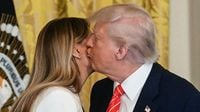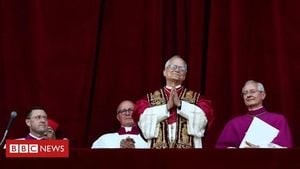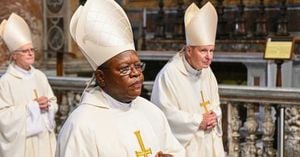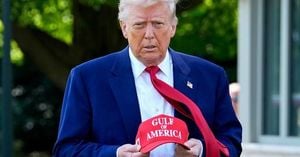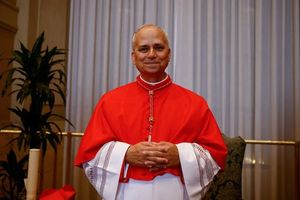On Thursday, May 8, 2025, President Donald Trump congratulated Cardinal Robert Francis Prevost on being named the first U.S.-born pope, marking a historic moment for the Roman Catholic Church. Prevost, originally from Chicago, will take on the name Pope Leo XIV and succeeds Pope Francis, who passed away on April 21, 2025, at age 88.
Trump took to his Truth Social platform to express his excitement, stating, "Congratulations to Cardinal Robert Francis Prevost, who was just named Pope. It is such an honor to realize that he is the first American Pope. What excitement, and what a Great Honor for our Country. I look forward to meeting Pope Leo XIV. It will be a very meaningful moment!" His enthusiastic remarks reflect the significance of this election not only for the church but also for the United States, as Prevost is the first American to hold this esteemed position.
The announcement of Prevost's election came after white smoke rose from the chimney of the Vatican's Sistine Chapel, a traditional signal of a new pope being chosen. This event followed a papal conclave that began on May 7, where the cardinals deliberated until they reached a decision on the successor to Pope Francis.
Pope Leo XIV, at 69 years old, has spent a considerable part of his life serving abroad. He was previously the Bishop of Chiclayo in Peru from 2015 to 2023 and is a naturalized citizen of the country. His background and experiences abroad may bring a unique perspective to his role as pope.
Despite the celebratory atmosphere surrounding his election, the relationship between Trump and the Catholic Church has been complicated. Earlier this month, Trump shared an AI-generated image of himself in papal regalia, which many Catholic officials found deeply offensive. The image was criticized as "extremely disrespectful" and "blasphemous," further complicating Trump's standing with some church leaders.
Moreover, Pope Leo XIV has not always aligned with Trump’s political views. A verified account linked to the new pope shared an article in February criticizing Vice President JD Vance over his interpretation of Jesus' teachings, stating, "JD Vance is wrong: Jesus doesn't ask us to rank our love for others." Additionally, the account reposted a tweet in April that condemned Trump's immigration policies, highlighting the suffering caused by mass deportations.
During a military families event at the White House, Trump expressed his joy at the election of the new pope, humorously noting, "I've seen the smoke but I haven't seen the pope." His remarks, filled with excitement, were accompanied by affectionate gestures towards his wife, Melania, underscoring a celebratory mood amid the formalities of the occasion.
As the new pontiff, Pope Leo XIV faces a multitude of challenges, including addressing the church's stance on various social issues and navigating the complexities of modern politics. His election is expected to generate significant interest both within the Catholic community and beyond, as many look to see how he will lead the church.
Internationally, reactions to Prevost's election have been mixed. Russian President Vladimir Putin also extended his congratulations, expressing hope for constructive dialogue based on Christian values. This response indicates that the new pope's influence could extend beyond religious matters, potentially impacting international relations.
As the world watches, the Vatican prepares for a new chapter under Pope Leo XIV. His first public appearance was marked by a speech delivered from the balcony of St. Peter's Basilica, where he greeted the cheering crowds with the phrase, "Peace be with all you." This message resonates deeply within the context of the church's mission and the expectations placed upon its leaders.
In the coming days, more details about Pope Leo XIV's vision for the church and his plans for addressing pressing issues are likely to emerge. The global Catholic community, along with political leaders and observers, will be keenly interested in how this historic election shapes the future of the church and its role in global affairs.
As this story develops, it will be essential to monitor the reactions from both supporters and critics of the new pope, as well as the implications of his election on the broader political landscape. Trump's enthusiastic support for Prevost may serve to galvanize certain segments of the population, but it could also provoke backlash from those who see the intertwining of politics and religion as problematic.
Pope Leo XIV's tenure as the first American pope is not just a personal achievement; it represents a pivotal moment in the history of the Catholic Church, one that may redefine its relationship with the United States and the world at large.
